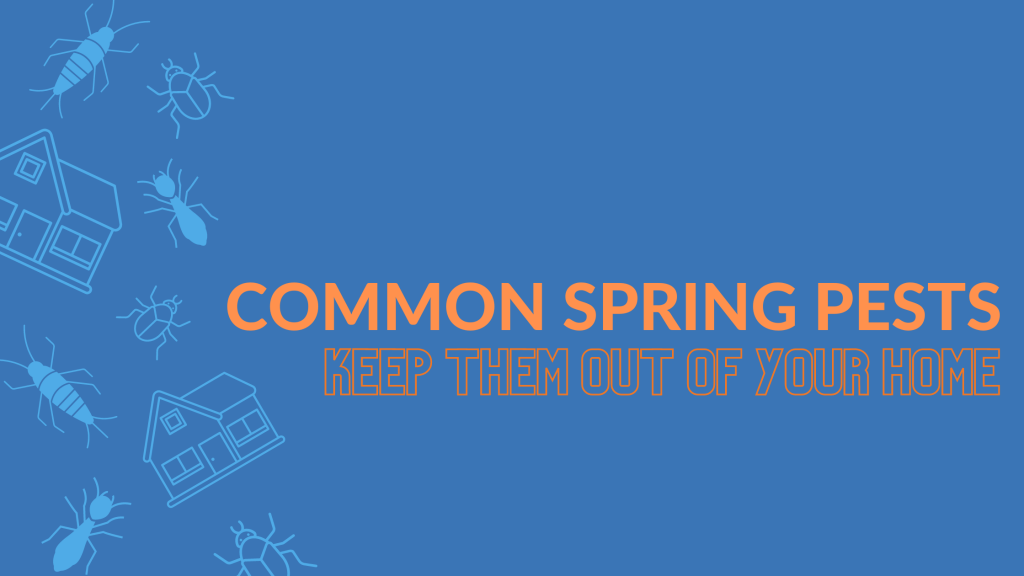Common Spring Pests & How To Keep Them Out

With spring on the way, now’s the time to take measures to prevent common spring pests from making their way into your home. Many pests reemerge as the temperatures slowly rise. Learn which pests can bring mayhem and problems in your home and what you can do to stop them before they get out of hand.
Carpenter Ants
As it gets warmer outside, carpenter ants come out from underground and look for new locations to find food and shelter. These ants are often seen outside of Ohio homes but an outside nest can lead to a colony within the walls of your home. The create tunnels in wood structures that can lead to significant and expensive damage. If not treated immediately the damage can become so severe that it may threaten the integrity of your home’s structure.
Pavement ants
If you’ve ever walked around on a sidewalk during the summer and seen anthills poking through the cracks, these little guys are likely what you came across. Pavement ants typically enjoy living outdoors in soil but sometimes they find their way into homes to find food. Their colonies are typically quite large and won’t decrease until appropriate treatment is applied.
Ant Remedies
Ants are typically drawn to food sources more than shelter. They’ll often eat just about anything that humans eat so it’s important to take these steps to ensure your food supply doesn’t become their food supply:
- Make sure your food is properly stored and put away immediately after use
- Try to keep food in the refrigerator (where the fridge acts as a barrier)
- For foods that can’t be refrigerated, put them in tightly sealed containers
- After prepping food, make sure to clear all food scraps from your counter and floor
Hornets and Wasps
As it warms up and gets closer to summer, you’ll probably start to notice more yellow-bodied pests buzzing about. Once pests like wasps, hornets, and yellow jackets wake up from their winter hibernation, they’ll quickly look for places where they can lay eggs and reestablish their colonies. Make sure to treat areas where you see these types of pests coming in and out of as quickly as possible.
Spiders
Spiders are usually found in places where humans aren’t as active. You’ll likely stumble across more spiders in your basement, attic, garage, porch, and utility room than anywhere else. Spiders appear most often to search for food. Unfortunately, spiders in your home is an indication that you have other insects also living in your home.
Though spiders can be menacing and creepy, they’re also a necessary pest. They prey upon other pests and prevent those pests from infesting. Of course, it completely depends on the type of spider you come across. Some spiders known to bite and can be especially dangerous to children and pets.
Houseflies
You’ll probably be tempted to open up your doors and windows as the weather gets warmer. Be mindful that you’re not letting in these tiny bothersome bugs. Once houseflies find their way inside through an opening, they can be incredibly difficult to get rid of for good. The best solution is to keep your doors and windows shut if you don’t have screens.
Fleas
A common pest that is most problematic with pets. Make sure your family pets are receiving annual baths and flea treatments, especially if you often walk them outside.
Rats and mice
Rodents can be a nuisance at any time throughout the year. These can be some of the worst types of pests if found in your home. Make sure to identify possible entry points (such as cracks and openings around the exterior of your home). Seal them up as soon as possible. Areas with poorly fitted doors/windows, vents, roof gaps, and pipes can all be potential entry points for these pests. As with ants, if you find a mouse or rat in your home, double-check that all food sources in your home are kept in tightly sealed containers.
Don’t let pests infest your property this spring. Take action now to avoid a headache going into the summer. To get rid of a current infestation or to learn how to protect your home from future pests, contact go2-pros pest control. Contact us today for a free estimate and evaluation of your home.
